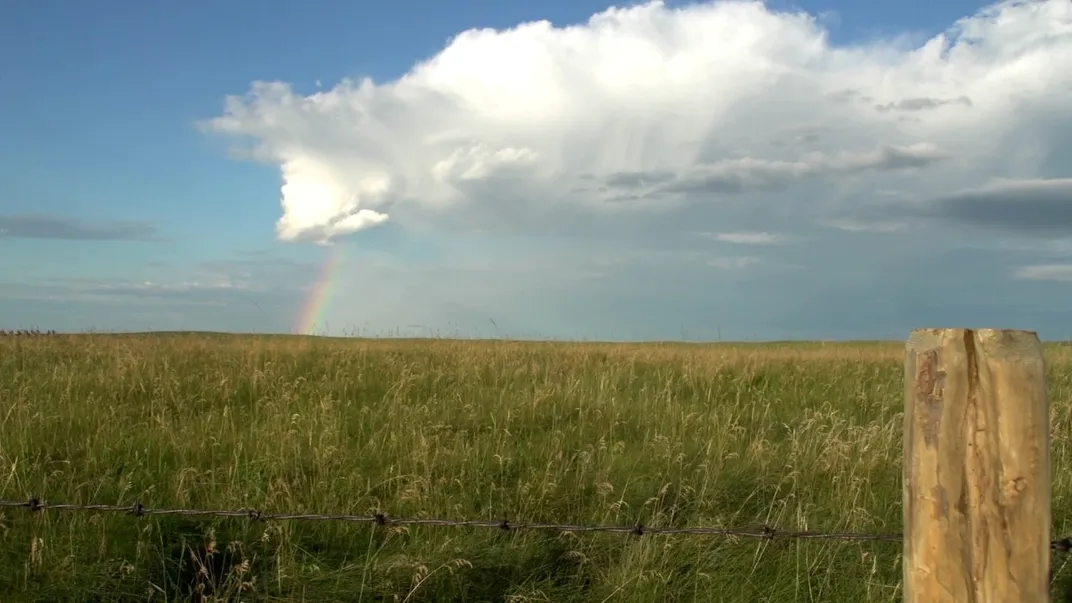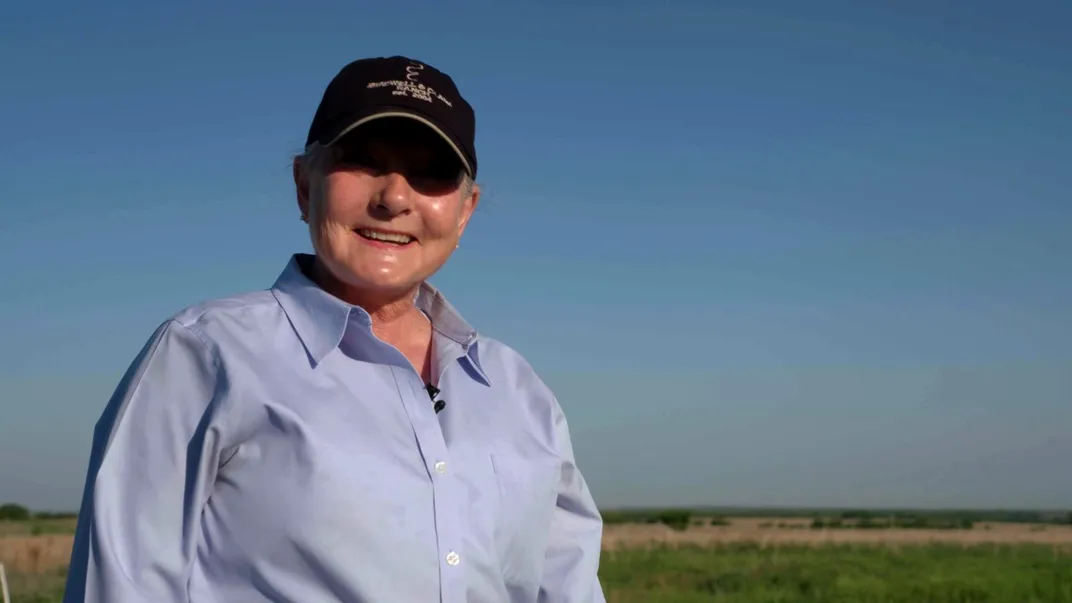Saving our Planet Starts in the Soil
Earth Optimism speaker, Peter Byck, discusses his latest documentary ‘carbon cowboys.’
/https://tf-cmsv2-smithsonianmag-media.s3.amazonaws.com/blogging/featured/thumbnail_image002.jpg)
Peter Byck is a Professor of Practice at Arizona State University, in both the School of Sustainability and the Cronkite School of Journalism. He is the director, producer and writer of carbon nation. He is currently helping to lead a $6.3 million research project focused on Adaptive Multi-Paddock (AMP) grazing; collaborating with 20 scientists and 10 farmers, focused on soil health and soil carbon storage; microbial, bug and bird biodiversity; water cycling and much more. Byck has currently completed carbon cowboys, a feature-length documentary (in ten parts) focused on regenerative grazing: www.carboncowboys.org and is in production on a long-form documentary on the AMP grazing research project.
The trailer for carbon cowboys premiered during the 2020 Earth Optimism Digital Summit during which Byck also shared a bit more about the film as a speaker for a ‘Telling the Story’ session. Ahead of the premiere of carbon cowboys, Earth Optimism Communications lead Cat Kutz chatted with him to learn more about the regenerative farming the film highlights and how it can shift the way we think about food, climate and the future of farming.
The first question that I had for you is hopefully an interesting one. If you were to tell us about the film in just a tweet, How would you describe it? So that's less than 280 characters…
I would say, 'Meet the American farmers who are regenerating their soils and discovering solutions to climate, food security and water security. While finally making money growing us healthy food.'

That's perfect. It's engaging and it definitely sets people up for something that they'd want to learn more about. I like that. Now, can you explain soil carbon storage and how this impacts agriculture?
Sure. Organic matter, the things that were once alive and have now died in the soil, are built of carbon – old microbes, old roots. And when you have a system that has a lot of microbes and a lot of roots and those things die, they actually create the structure for the soil, besides all the mineral material. And that structure actually has air in it and it's squishy like a sponge. The carbon within those dead microbes and in those dead roots is very durable and lasts for decades or centuries.
And so that carbon was taken out of the atmosphere through photosynthesis from the leaves of the plant. The plant then burps out oxygen, keeps the carbon, mixes the carbon with water and creates these sugars that then go down through the plant’s roots and feeds the microbes. And so when you have a system that has a lot of different plants, it ends up having a lot of different microbes in the soil. Biodiversity above ground equals biodiversity below ground, and all of that material as it dies off, becomes actual soil structure and then that soil then becomes the home for the next round of life.
The dead stuff is still food for the plants and that structure actually is like a sponge, so healthy soil is not compacted, it’s absorbent. So if you have a system with great plant cover and great healthy soil structure, when you get eight inches of rain in a day it all soaks into that farm, but across the fence, they are in flood conditions. Where the next day that farmer can be out in the field working, across the fence they're out for two weeks with that eight-inch unusual rainfall that we're getting more and more of.
But what's also amazing about that spongy quality of the soil that's made up of so much former life and full of carbon, is that it's got so much surface area that it actually holds water longer so the water doesn't evaporate as quickly. So in drought conditions, again, because the plants are covering the soil, the soil doesn't overheat and the overheating doesn't cause evapotranspiration beyond what normally happens to the plants. You've got the soil that's holding onto water longer, so on the side of the fence where the farmers focused on soil health, they're growing forage for their animals, a month or months longer than their neighbor in the drought. The neighbor has to go buy hay or sell their animals, while this farmer is still growing food. And so there is a huge economic benefit to having healthy soil.
The more carbon in the soil, the more plants and more photosynthesis and more drawing down of the CO2 from the atmosphere. The more you're putting that carbon into that soil system, it's still going to cycle. It's still going to get back out into the atmosphere. But it's going to take decades and centuries, rather than when you plow it – that's the immediate release of carbon from the soil that binds with the oxygen, you’ve got CO2 building up, leading to climate change. So right now, there's just a heck of a lot of CO2 in the atmosphere and that carbon – they think like a fifth or more of the carbon that's up in the atmosphere right now – came from the soil systems.
And so let's get that carbon back in a place where it's part of a very healthy cycle as opposed to where it is right now, in the atmosphere – where it's part of a cycle, but it's a warming cycle beyond what we have grown accustomed to. We have coastal cities, we'd like to keep them.
So we're talking about farmer resiliency and right now in the current global crisis, we're seeing a huge effect on them because of the food waste and other issues that are rising from the pandemic. Does regenerative farming help protect them from these effects?
I think you're seeing a lot of that food waste in really bad situations. It's happening in the meatpacking industry, but I don't think you're seeing that from the regenerative farming community. I think you're seeing that from the industrial farming community.
The farmers that I know of that sell directly to customers and some farmers in our films their sales are up between 300 and 1,000% They're selling out.
There are places that I ordered from online that are sold out of meats where they were never sold out of these things. And so, so they're actually much stronger right now – the ones who are either already selling to customers or pivoted to selling to customers. And so I think this is a pretty amazing sign that focusing on soil health is actually a great business plan.

I have one farmer who has a farm store and he said he's never seen lines out the door before -- he's had lines out the door. And I'm sure he's keeping everyone six feet away from each other.
But you know, people had to pivot... One of the farmers in our film, Allen Williams, he has a company called Joyce farms. He's part of that company, and overnight, they lost 75% of the business selling meat produced in a regenerative way to Disney. So all those cruises, Disney World, all that stuff just went away overnight and they pivoted and they started having these parking lots. Sales selling out all over the southeast.
Wow. It's almost as if people are kind of relearning how to get good quality food as a result of the pandemic. A lot of the public is gaining this awareness by seeing firsthand how important farming is… so do you think that this is a climate solution and these kinds of initiatives are going to become more bipartisan as time goes on?
I would hope so. I don't know anyone who doesn't want soil health. But there's a whole lot of farming going on in the country right now that doesn't lead to soil health. And so how do you change that and how do you change that quickly? That's, that's the stuff that I think about and collaborate with people about and plan. Try to come up with more game plans and pilot programs. That's, that's sort of where my focus is right now. But I think people trust nature. I know people trust nature. And when you get into a stressful situation, you want to, you want to go to what you know works. And these farmers are working with nature and their customers are coming to them.
When I was on the road with carbon nation, I mean, one guy said, because he heard I was making a film about solutions to climate change, he said to me, ‘You and I are going to disagree about everything.’ And then we dug into it, and we agreed on about 70% of how we'd run the country. That blew us both away. We realized that there's a lot more common ground than any newscast will tell you. Back then I was looking at solar and geothermal and energy efficiency and the reasons that the Department of Defense should be concerned about climate change and national security and all those things.
But then when I started working specifically on soil and healthy soil and rejuvenating soil and seeing what was happening with me and the farmers that I was meeting; we were getting along, in total agreement about soil heath. And we definitely have different politics. Then I realized that the common ground… is the ground. I've always been hunting for where people already are in agreement. It's just they haven't had the opportunity or taken the time or broken through the noise to find out that there is an agreement, and people agree about healthy soils.
We're working on helping more and more people rejuvenate their soils. It's so important, it touches so many issues. It's what the Smithsonian always talks about – it's what Earth Optimism is all about.
Yes! And definitely sharing the solutions… We like to think that the more you share solutions, the more solutions then come from that. It's like the greatest aggregator of positive change is being able to share your story.
Exactly, and farmers will learn from our films. That would be a home run for us if it's already happened. Some of the parts of our documentary, called paddocks, have been in festivals as standalone short films and farmers have called us to ask how they can do this and can we hook them up.
So we're hoping this big film will inspire more of that, and wouldn't it be amazing if a lot of farmers wanted to learn about this because they saw it's just good business?
Are there any barriers that you have to overcome to get farmers to watch your films particularly because of the climate change element?
Our films aren't climate-focused, they’re farmer-focused. Yeah, the climate piece is my driver, but it's not all over the films at all. Partly because we wanted to communicate with farmers, and we know it makes sense – a farmer wants to listen to a farmer.
And so we wanted to make films that would highlight those conversations so that farmers could learn from farmers, but we also wanted these films to speak to a consumer and remind them to know where they’re getting food – go meet your farmer.

People are now spending so much time in their area now. Maybe they'll understand meeting their farmers is a part of being in your local area and that farmers can produce food that they know is going to be eaten by the people in their local area, kind of like it was 60-70 years ago.
It's like what Will Harris says in 100,000 Beating Hearts: He doesn't have to feed the world; he just has to feed his community. This idea that every farm is supposed to be some big monolithic industrial complex because they have to feed the world – that's a construct. That's not a truth.
There are some farmers that are going to produce enough food so that we could export it to Canada and Japan and England and elsewhere... Great. That's fantastic. But if every farmer really focused on feeding their community, the world would get fed. Something like 85% of farmers are smallholder farmers with an acre, or two acres, or half an acre. So the idea that you have to feed the world with any method that hurts our soils doesn't make sense to me.

Farming to regenerate soils, farming so that next year the soils are in better shape than they were last year. That makes sense to me. To me, the scale is not the goal, but profit per acre – that would be a great metric for farmers. How much profit did you make per acre? Not how many bushels did you produce per acre? And when farmers do well, they feed us.
Well, since you bring that up, it's interesting to think about it from the consumer side too. Do you think that this film is a good way of explaining to consumers that this is a way that they as an individual can help mitigate climate change by supporting our community soils?
Absolutely. There's a lot of consumers who have stopped eating meat because they didn't like the way they saw the larger meat industry going. But then when they find out how these animals are treated in all of our films by these farmers – there are a lot more regenerative farmers than what we filmed, obviously, and it's growing – I've seen and heard of a lot of people who've come back to eating meat because they know where the meats being produced, and they can meet the farmer and they could see it’s a different situation.
So at the end of this farm is medicine (one of our paddocks), the farmer tells a story where these people come to his farm and they hadn't eaten meat in years and years. But they looked at how he was treating the animals and how his operation looked and they bought some meat from him and he was surprised. So that's the end of one of our films
But then a buddy of mine, who wrote the music for 100,000 Beating Hearts, was vegan, his wife's vegan, and they are raising three incredibly cool kids that are all vegan. And so when I called him and said, ‘Hey, I want you to work on the music for this section of the film. Are you up for it? It's about meat.’ He looked at a rough cut and goes, ‘Wow, these animals are really well treated. Of course, I'll work on this.’ And then a couple of years after he did the music, he told me that he had started eating meat again. And it was because he'd met a farmer after the experience he had working on this film. And he saw a system that was working, that was making things better. And he was happy to participate in that.
I've got plenty of friends who don't eat meat and I wouldn't ever have suggested to my composer friend that he should eat meat – never in a million years. Everyone should eat what they want to eat. But I can say that if you're going to be eating vegetables, your vegetable nutrient density will be a lot higher if they're grown in soil that's really, really rich with soil microbes and all the biodiversity of all the little critters in the soil that feed the plants and make sure the nutrients get to the plants.
And one of the quickest ways to get those soils healthy is adaptive grazing and so even if you don't eat meat, you sure do want your row crop production combined with your animal production - in a very old fashioned way - to get those soils as healthy as possible because that makes healthy food. Makes sense?
Yes definitely! It's interesting that as more people try to eat a diet with the planet in mind how often and how easy it is to forget the best way to do that is just to go find a farmer.
Yeah, and it's the processed foods that will get you as far from a farmer as possible. I haven't really seen a highly processed food that's good for the planet, although some folks might say they are.
Yeah, maybe better in some cases than some of the alternatives, but that doesn't necessarily mean it's good. Perhaps it's the lesser of two evils in some cases, and so it's just an interesting way to look at it...
According to a buddy of mine, a scientist at Michigan State, if you add up the three major crops we grow the United States – corn, soy, hay – you put that on one side of a scale and then you put on the other side of the scale the soil we lose every year to erosion… the soil will weigh more. Our top export from our major farming industries in this country is soil, that can never be used again. That can't last, and so there's a lot of concern and worry about our soils becoming less and less robust, less full of carbon, less able to produce food... and then even the food that’s produced is less nutrient-dense.
This type of grazing is a phenomenal way to read rejuvenate and regenerate soils. It's getting attention now – we're seeing it. And there are people who have been working for decades on this. I've been working for seven or eight years on this from my perch. But things are changing. I really do think things are changing.



